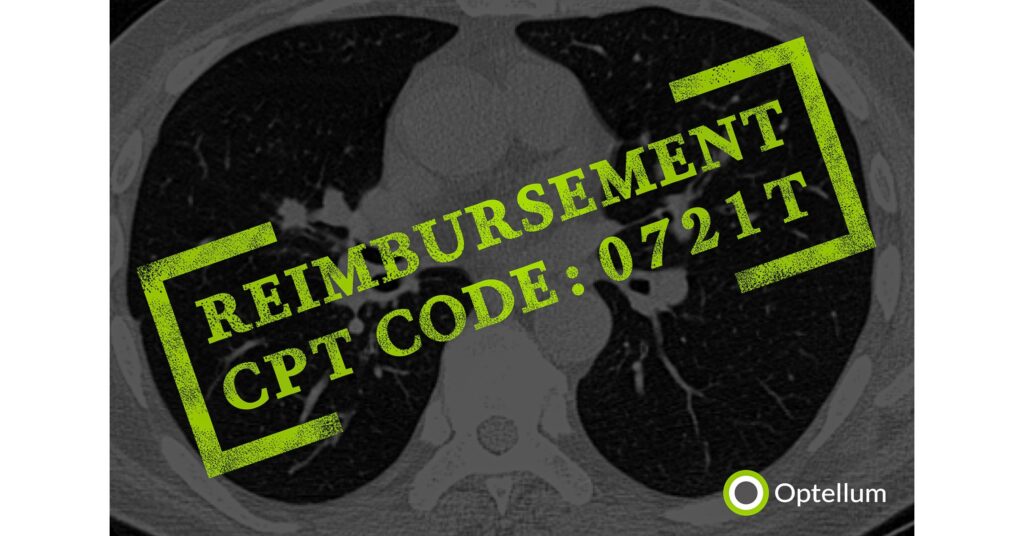Effective July 1, 2022hospitals that bill CMS for Optillum Lung Cancer Prediction for their Medicare patients will be eligible for reimbursement at a rate of $600–$700 under temporary CPT code 0721T to describe quantitative CT tissue characterization performed separate to a computed tomography (CT) scan. These temporary codes are assigned specifically to identify new technologies such as Optellum’s AI-powered decision-support software, which is already in use in several leading hospitals in the United States.
“This is another step in Optillum’s progress towards becoming the standard of care for early lung cancer diagnosis. It can be difficult for patients to access new technologies because providers and physicians are often not able to offer services that are not reimbursed,” said Optillum CEO Jason Besterfield. “This new payment assignment is an important step towards incentivizing providers to make the technology more widely available.”
Optilum’s Virtual Nodule Clinic integrates the clinically validated Lung Cancer Prediction (LCP) score based on imaging AI and has the potential to improve clinical care coordination and decisions, with the aim to get patients treated before the disease has metastasized, thereby crucially increasing lung cancer survival rates.
In 2021, Optillum received FDA 510(k) clearance as the first AI-assisted diagnosis application for lung cancer. This year, the company secured CE and UKCA certification, allowing the technology to be used in Europe and the UK.
Dr. Reggie Munden of the Medical University of South Carolina is a supporter of Optilum’s technology. He has extensive experience in the application and translation of imaging research for evaluating lung nodules and lung cancer. He has participated in over 40 clinical trials and served as the National Lung Screening Trial (NLST) site PI for the MD Anderson Cancer Center (MDACC). His current role is as Professor and Chair, Department of Radiology and Radiological Science Chief, ICCE – Radiology at Medical University of South Carolina.
He views investments in new AI-based technologies for lung cancer management as critical to the future of medicine, commenting:
“CMS’ decision on Optillum’s technology for lung nodules is recognizing the importance of ground-breaking technology that will improve patient care outcomes. Optellum’s early lung cancer diagnostics allows academic medical centers like ours to advance patient care while controlling costs.”
Optillum was founded with the vision of providing clinical decision support software that could help lung-disease patients be diagnosed and treated with curative intent at the earliest possible stage. This is important because the five-year survival rate for lung cancer patients due to most diagnoses occurs in stages III or IV. By comparison, the survival rate for small lung tumors treated at early stage is up to 90%.[1] Throughout the US, two million incidental lung nodules are identified every year, but as many as 60% of patients do not receive follow-up care.[2]
About Optilum
Optilum is a commercial-stage lung health company providing AI-powered decision-support software that assists physicians in early diagnosis and optimal treatment for their patients. The company was founded so that every lung disease patient is diagnosed and treated at the earliest possible stage, when chances of cure are the highest. Optillum’s roadmap extends beyond lung cancer diagnosis and treatment to other deadly diseases of the lungs, including interstitial lung disease (ILD) and chronic obstructive pulmonary disease (COPD). Optilum has headquarters at the Oxford Center for Innovation in Oxford, United Kingdom and a US office at the Texas Medical Center in Houston, TX. Optellum has received grant funding from InnovateUK, the National Institute for Health Research (NIHR), the NHS AI Lab, The Accelerated Access Collaborative (AAC), MedCity and EIT Health. For more information, visit optelum.comor follow us on LinkedIn and Twitter.
[1] Surveillance, Epidemiology, and End Results (SEER) Program (www.seer.cancer.gov) SEER*Stat Database: SEER 18 2010–2016, All Races, Both Sexes. Available at https://seer.cancer.gov/statfacts/html/lungb.html
AJCC Lung Cancer Staging manual (7th edition)
[2] Pyenson BS, Bazell CM, Bellanich MJ, Caplen MA, Zulueta JJ. No Apparent Workup for most new Indeterminate Pulmonary Nodules in US Commercially Insured Patients. JHEOR. 2019;6(3):118-129.
SOURCE Optilum
.

